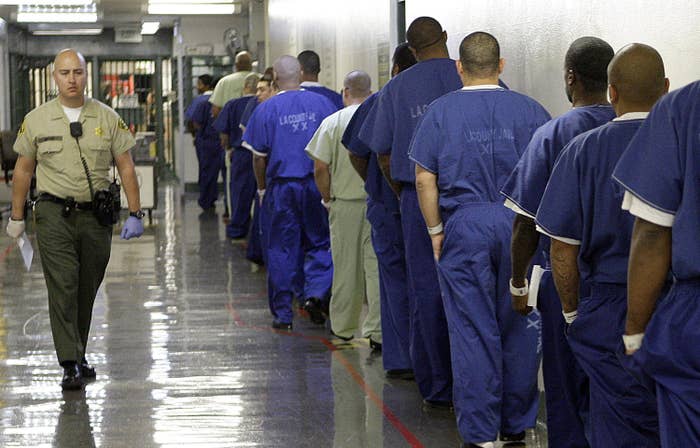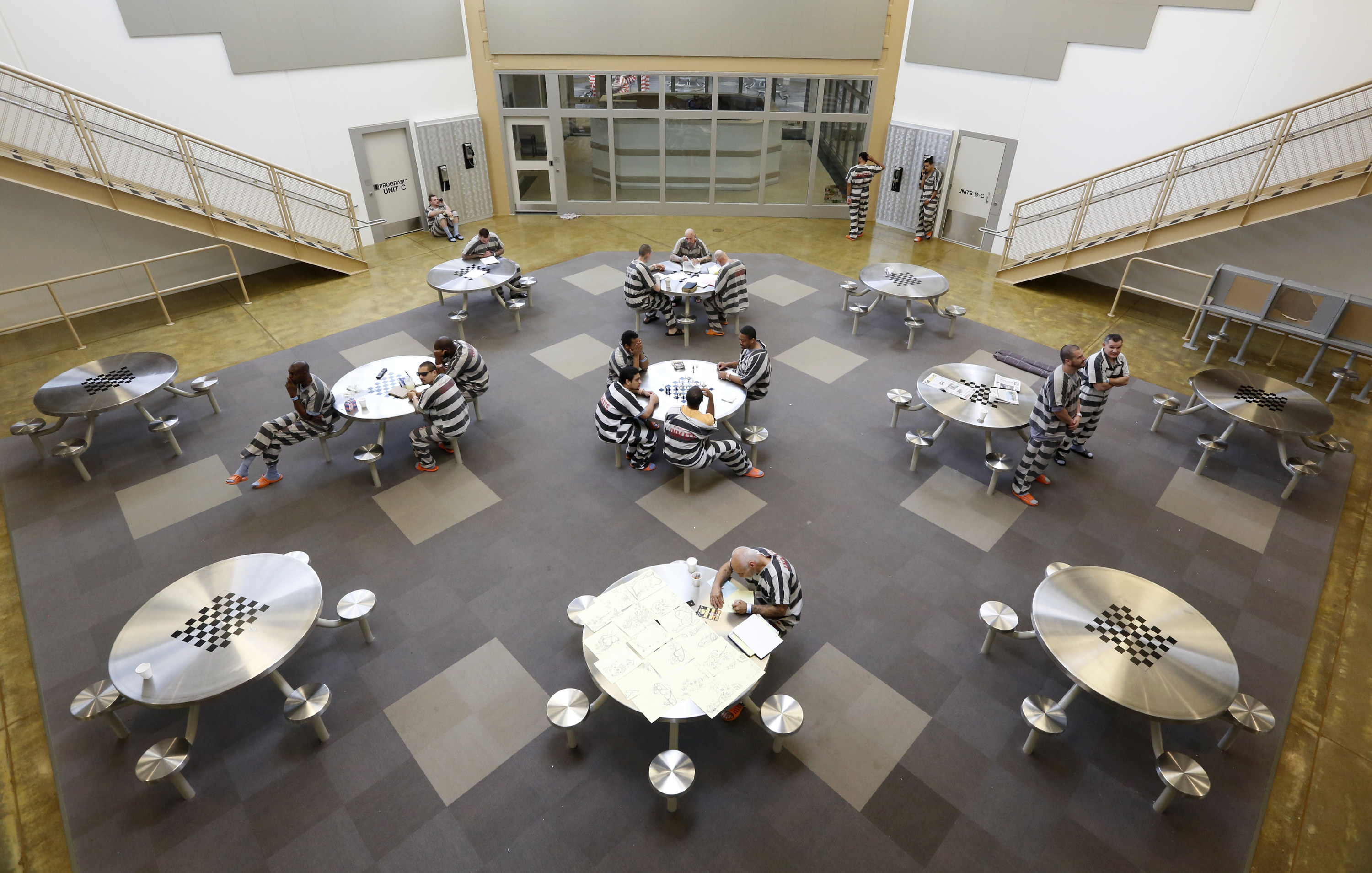
The journalists at BuzzFeed News are proud to bring you trustworthy and relevant reporting about the coronavirus. To help keep this news free, become a member and sign up for our newsletter, Outbreak Today.
Advocates say prisons and county jails are "powder kegs" waiting to blow in the coronavirus pandemic. As confirmed cases of COVID-19, the disease caused by the novel coronavirus, rise among inmates, they worry others who get infected won't come forward until it's too late.
As of Monday, at least four people incarcerated at US prisons have tested positive for COVID-19 — including Harvey Weinstein. Meanwhile, several dozen cases have been confirmed among inmates and staff at New York City's jails, particularly Rikers Island. Inmates are restricted to small cells in sometimes crowded conditions and with limited cleaning supplies; former prisoners and advocates told BuzzFeed News the conditions are ripe for a widespread outbreak, and they worry the limited health care resources available to inmates will quickly be overwhelmed.
"If you think a cruise ship is bad, think of a prison," Kate Chatfield, senior adviser for legislation and policy at the Justice Collaborative, told BuzzFeed News. "They're sitting ducks."
Those inmates who do become infected, advocates added, might not inform health care staff they're feeling sick out of fear that the treatment is worse than the disease. Quarantine may involve time in the same solitary cells used to punish inmates. Any reluctance to come forward about symptoms could give the virus a running start to spread well before it is detected.
"Quarantine is punitive," Adnan Khan, executive director of Re:Store Justice and a former inmate at San Quentin State Prison in California, told BuzzFeed News. "For [inmates] it's known that, if you don't just have the flu, sniffles, or something like that, there's fear of going to solitary confinement."
Khan went through the experience himself in 2015, he said, when he spent three days experiencing hot and cold flashes in his cell, shivering and unable to keep any food down.
He quickly decided not to ask for medical help because he knew he'd be removed and placed in the same cells that were used as solitary confinement for inmates who violated rules or got into fights. He had spent 30 days in solitary himself over a fight in the prison and, like other inmates, was intent on avoiding going back if he could help it.
In solitary, he said, there were limited resources; no personal items were allowed, and there was no access to phones or other inmates who could get the word to family or friends on the outside.
"So all I did was drink water from my sink," he said. "A lot of people do that."
Michelle Lind, whose 73-year-old husband is incarcerated at Sullivan Correctional Facility in Fallsburg, New York, for attempted murder, said her husband spent months refusing to tell correctional officers or nurses he was seriously ill until he collapsed during a visit in 2017.
"He doesn't want to ruffle any feathers; he doesn't want to ask for anything," she said. "He doesn't act like it, but he's scared."
Her husband, Robert Lind, had to have surgery after doctors found he had been infected with Helicobacter pylori, a bacteria that causes sores and ulcers in the stomach, for about two years.
"He was telling them his stomach was upset, and they were feeding him Zantac [for months] like candy," she said.
For her husband, isolation from the general population meant losing privileges, access to the small number of personal belongings he had, and, worst of all, the daily phone calls he makes to her.
A few months later, Lind said, her husband was diagnosed with prostate cancer and underwent a month of chemotherapy. His follow-up appointments to see if that treatment was effective have now been canceled because of concerns over the pandemic. Because of the cancer diagnosis, she said, she particularly fears for his vulnerable immune system.
His only defense against getting sick, she said, is the bottle of bleach he and other inmates are now given daily to disinfect their cells — a hot commodity since bleach is normally considered contraband.
"I ask him, 'Is anyone in there coughing? Do you see anyone with signs [of COVID-19]? Stay away from them,'" she said. "But it's a Petri dish in there."

If he gets sick, Lind said, she worries her husband won't come forward to get the help he'll need. And if he does, she said, she won't know what's happened to him if he is taken to solitary or another facility.
Fears of being isolated are widespread among inmates, said Elle, whose fiancé is at San Quentin State Prison and who asked to be identified by his first name out of fear that he could face reprisal. At many facilities, visitation has been canceled to prevent the spread of the virus, leaving inmates with one fewer line to the outside world.
"If they come forward, you get tossed in solitary," Elle told BuzzFeed News. "It has a chilling effect because people don't want to come forward — because they'll be in the hole."
Colby Lenz of the California Coalition for Women Prisoners echoed those concerns.
"We often hear reports of people that won't seek medical or mental help," she told BuzzFeed News. "They know they risk being further isolated in solitary or suicidal watch cells."
Some prisons and jails have taken preventative measures such as limiting movement of inmates within facilities and giving more access to cleaning supplies.
But Lenz said her organization has heard from inmates who said they haven't received the supplies, and that cells — sometimes housing four, six, or eight people each — are themselves high-traffic areas.
"It's an existing public health nightmare, and then you add a pandemic that requires social distance and sanitation — it's a powder keg," she said. "It's a terrifying situation."
Because of these issues, inmate advocacy groups across the country have been asking states and counties to consider releasing inmates, especially those who are elderly, have health conditions that put them at higher risk of COVID-19, or are approaching the end of their sentence.
"Why let them die in prison?" Jose Saldana, director of the Release Aging People in Prison campaign in New York, who also spent 38 years in state prison himself. "They weren't sentenced to death, they were sentenced to long sentences."
Saldana's organization is also petitioning for the release of older inmates, who he said are more vulnerable at this time. If a virus is introduced to the population, he said, it won't be from the inmates themselves, but by the staff.
"Right now there are not a lot of cases being reported, but this is how it starts," he said. "it starts with a few."
Advocates said an outbreak is only a matter of time.
"They know this is a crisis, and they know this is coming," Chatfield with the Justice Collaborative said. "It's impossible to social distance a sheriff's deputy or a correctional officer who moves people from one cell to another or a cafeteria. People are being touched in proximity constantly."
Hotels, motels, or university buildings could be commandeered to house some of the most vulnerable people while the outbreak is ongoing, she said, and others who are nearing the end of their sentences could be released to their families. But she worried that some states and counties are running out of time.
"If there's a bomb in a building, you don't want the bomb squad to stand outside and wonder about where they want to take people," she said. "You want to get people out now."
Most law enforcement agencies have consistently opposed any form of early release, but the pandemic has prompted some to reconsider.
In Los Angeles County, the sheriff's department last week began releasing some jail inmates who had fewer than 30 days remaining in their sentence. All law enforcement agencies in the county, including the LAPD, also began drastically reducing their number of daily arrests — opting to cite and release people where they could.
"Our population within our jails is a vulnerable population just by who they are, where they are located, so we're protecting that population from potential exposure," Los Angeles Sheriff Alex Villanueva said at a press conference.
In Cuyahoga County, Ohio, the jail population dropped from 2,000 to fewer than 1,300 people on Friday, with officials releasing nonviolent offenders to probation and people who are most at risk of the coronavirus.
"We feel it's not if this pandemic hits, but when it hits our jail," Cuyahoga County Common Pleas Administrative Judge Brendan Sheehan told the Associated Press.
On Monday, New York City Mayor Bill de Blasio said in a radio interview that city jails are considering releasing about 200 inmates who have underlying health conditions, are elderly, or have served most of their sentence.
Lind said she's glad to hear that, although she's still waiting to know what will happen to her husband. He applied for clemency from the New York governor's office in 2016 and is still waiting.
He told her that inmates worry the prison commissary will not be replenished once supplies run out, and she urged him to stock up now on food. There's still no word on whether his cancer treatment was effective, and he's feeling the aftereffects of chemotherapy as he sprays down his cell with bleach multiple times a day, she said.
"The system is going to kill him one way or another."
